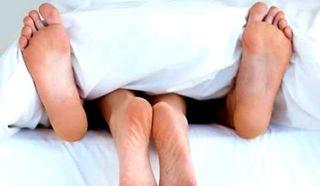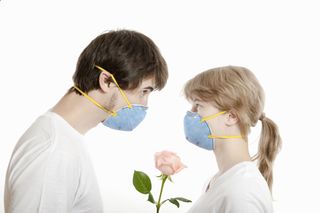7 Embarrassing Health Problems
Intro

Whether it's excessive sweating or hemorrhoids, most people have had to deal with an embarrassing health problem at some point in our lives.
But some conditions are not only embarrassing, but can also signal a greater health problem.
For example, nighttime bedwetting in adults could be due to an overactive bladder, medications taken for insomnia or mental illness, or problems with the signaling of antidiuretic hormone, which tells the kidneys to lower urine production at night. Studies show that at least 2 percent of adults can't control their bladder during the night, according to the National Association for Continence.
Some embarrassing problems can be remedied, or at least managed. Take a look at seven health problems you might avoid talking about, and what can be done about them.
Getting acne as an adult

More adult women are getting pimples, according to a study presented at the American Academy of Dermatology annual meeting in March.
In fact, out of nearly 2,900 women, researchers found 45 percent of those between ages 21 and 30 had acne, along with 26 percent of women in their 30s and 12 percent of those in their 40s.
Acne is caused when the pores of the skin becoming clogged with oil and dead skin cells.
Although dermatologists aren’t exactly sure why women are prone to acne, they say it may be due to fluctuating hormones during pregnancy and menopause, taking certain medications or having a family history of acne.
Prescribed topical antibiotics such as clindamycin or erythromycin are often used to treat adults with mild-to-moderate acne.
Over-the-counter medications that contain sodium sulfacetamide, such as Klaron, might also help.
Excessive sweating

Excessive sweating, also known as hyperhidrosis, can occur in people even when the temperature is cool, or when they’re at rest.
The condition affects nearly 3 percent of the U.S. population, according to the National Institutes of Health.
Experts believe hyperhidrosis occurs in people who have overactive sweat glands, and in those who have other medical issues such as anxiety, heart disease, menopause or cancer.
Aside from using common remedies such as regular antiperspirants, doctors often prescribe those containing aluminum chloride to treat excessive sweating.
Anticholinergic drugs, which help to prevent stimulation of the sweat glands, also can be prescribed, but these may have side effects, including dry mouth, dizziness and problems with urination.
Iontophoresis, an FDA-approved procedure, uses electricity to temporarily turn off the sweat glands. The procedure involves placing the hands and feet in the water while a gentle current of electricity passes through it. Side effects, though reported rare, include skin cracking and blisters.
Experts have also found that Botulinum toxin type A (Botox) injections, used to smooth facial wrinkles, can treat severe underarm sweating. Small doses of Botox are injected to block the nerves that trigger sweat glands.
But using Botox for other areas of the body that sweat excessively, such as the hands, could cause mild, but temporary weakness and intense pain, so talk with your doctor first.
Peeing during sex

Men typically don’t pee during sex because they have a bladder valve that closes. It prevents semen that is going through the urethra from traveling up to the bladder, and also stops urine from mixing with the semen.
But no such valve exists in women, according to research.
Some scientists believe the leakage that some women feel is actually female ejaculation, while other scientists prefer not to use this term, because chemical analyses of the fluid has produced mixed results.
"It's possible for women to pee during sex," said Dr. Elisa Ross, a gynecologist at the Cleveland Clinic. "The bladder sits in your pelvis, so as women age, the bladder can sag a little, making it possible to pee a little during sex."
Weak pelvic muscles let the bladder sag out of position, which may stretch the opening to the urethra, allowing for urine to leak out, Ross explained.
She also noted that the controversial G-spot, a small bundle of nerves found deep within the wall of the vagina that contributes to orgasms, is believed to be located near the bladder neck, which could make a woman feel the urge to pee during sex, especially if she has an irritable bladder.
"The best thing to do when something like this occurs is to talk about it," said Bean Robinson, a psychologist at the University of Minnesota's Center for Sexual Health.
"Sex is messy anyway, so just be prepared for it."
Persistent bad breath

Halitosis, or bad breath, is often caused by a buildup of bacteria in your mouth from food, dry mouth, smoking or chronic illnesses. The buildup causes inflammation, and can give off a nasty odor that smells like sulfur.
In many cases, the best way to improve bad breath is with proper dental hygiene, according to the American Dental Association (ADA).
The ADA recommends regular professional cleanings from a dentist, as well as brushing your teeth twice a day and flossing once daily. They also recommend brushing the tongue.
Breath-freshening products such as mouthwash, mints and gum may help with bad breath, but these fixes are only temporary. If you must constantly mask bad breath, contact your dentist.
Sexually transmitted diseases

Sexually transmitted diseases (STDs) are a major public health challenge in the U.S. There are an estimated 19 million new infections every year, according to the Centers for Disease Control and Prevention (CDC).
Women are more prone to getting STDs because the lining of the vagina is thinner than that of the penis, making it easer for bacteria and viruses to penetrate.
Some of the most common STDs are chlamydia, gonorrhea, syphilis, HIV/AIDS and genital herpes, reports the CDC.
Although condoms generally provide the best protection against STDs, Ross cautioned that they might not fully protect against genital herpes.
"Herpes doesn't only appear on the genitals, but it can appear in the 'boxer shorts area,' which includes the butt, the upper thighs and lower abdomen," Ross said.
For people with genital herpes, she recommended taking an anti-herpes medication, such as Zovirax, Valtrex or Famvir, which can decrease the likelihood of passing on the virus.
For both men and women, if you experience a discharge or have any sores, you should bring that to your doctor’s attention immediately, said Ross.
Hemorrhoids

Hemorrhoids are an uncomfortable, yet common health problem that many folks have to endure. About half of all people have had hemorrhoids by age 50, according to the National Institutes of Health.
There are internal hemorrhoids, which are located inside the rectum, and external hemorrhoids, which are found under the skin around the anus.
Symptoms often include anal itching, pain during bowel movements, anal ache or pain, and bright red blood found on the stool, toilet paper or in the toilet bowl.
Straining during bowel movements, having constipation or sitting for too long are often the causes.
For mild symptoms, doctors often recommend using over-the-counter products such as creams, ointments or suppositories, to relieve symptoms temporarily.
But for bleeding, painful hemorrhoids that persist, doctors recommend a minor outpatient procedure. The rubber band treatment, for example, is one procedure where the doctor places one or two tiny rubber bands around the bottom of the internal hemorrhoid, cutting off the circulation and causing the hemorrhoid to shrink and fall off within a week.
"Vaginal farting"

"Vaginal farting," or the release of air from the vagina, may be embarrassing, but it's not uncommon when having sex or doing physical activities such as yoga.
"Honestly, we don't know what to do about it," Ross said. "Possibly increasing lubrication, or using a different angle during sex may help."
Robinson suggested talking about it with your partner before engaging in sex.
"Sex isn't civilized or controlled, so physical things could happen," she said. But she also said that if you are comfortable just ignoring it, that's OK too.
FollowMyHealthNewsDaily on Twitter @MyHealth_MHND. We're also on Facebook & Google+.
Sign up for the Live Science daily newsletter now
Get the world’s most fascinating discoveries delivered straight to your inbox.



